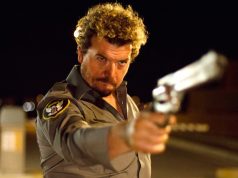The very first thing we see in “99 Homes” is the brain-spattered wall of an Orlando bathroom where a man has committed suicide rather than be evicted from his home. The evictor, a Florida-twanged foreclosure vulture named Rick Carver (Michael Shannon), stands with his back to the body, yelling into his phone about how this complicates the process of preparing the house for resale.
Ramin Bahrami isn’t kidding around here. The writer-director of warm character studies like “Man Push Cart” and “Goodbye Solo” starts his latest, a sort of morality play, on this dark note. It leads to a well-executed long take that follows Carver out of the house and into his car, barking orders to his clean-up crew while defending his callous attitude to police. The year is 2010, and he’s a realtor whose whole business is grabbing up foreclosed-upon homes.
Carver is the soulless counterpart to the film’s emotion-driven protagonist, Dennis Nash (Andrew Garfield), an underemployed construction worker and sensitive dad whom Carver evicts, along with his young son (Noah Lomax) and hair-stylist mother (Laura Dern), in an intense, heartbreaking scene that reverberates through the rest of the movie. The three move into a motel populated by fellow evictees while Dennis looks for work — and guess who needs a motivated jack-of-all-trades who can fix houses up so they can be flipped?
A job is a job, and Dennis begins to be drawn into Carver’s greed-driven operation. It includes plenty of actual law breaking, as well as the legal but unpleasant task of evicting people. (“First one’s a bitch, but you get numb to it,” Carver says.) Bahrani isn’t judgmental, but Dennis is getting his hands dirtier than he should. The suspense lies in not knowing how far he’ll go. We don’t know if this will end in tragedy.
Bahrani’s earnest, didactic style is occasionally strident, his points about the foreclosure crisis a little loud at times. But the simplicity of the formula makes the film read like a cautionary tale that a traveling troupe of actors would perform for medieval villagers. Carver is the devil, and so forth. Characters that aren’t needed, like Dennis’s father and his son’s mother, are just omitted from the story. Of course, this unsophisticated formula means accepting some plot contrivances (the motel Hooverville; the convenient way certain characters are connected) and a big, melodramatic finale that’s juuuust this side of ridiculous. But if you can go with it, it works.
Michael Shannon is magnetic as the conniving, acid-tongued Rick Carver, almost tipping over into cartoon villainy before giving us some perspective on the character. He makes the film funnier than you’d expect it to be, with Andrew Garfield’s expressive tearfulness balancing it out the other way. It’s a potent mix that’s more reminiscent of Bahrani’s most recent film, “At Any Price,” than his earlier, more sedate ones. He’s still evolving as a filmmaker, and this new story-driven approach is an interesting turn.
B+ (1 hr., 52 min.; )
Originally published at Vanity Fair.





